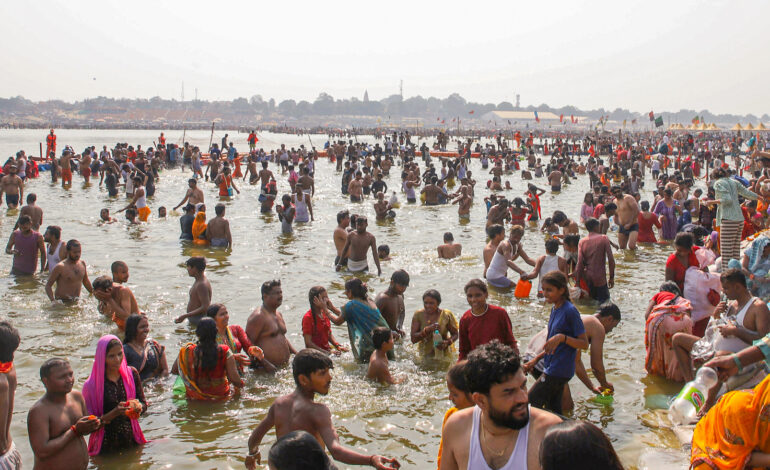
Water Quality in Prayagraj Fails Bathing Standards During Maha Kumbh: CPCB Report
Last Updated on February 23, 2025 by Srijan Raj
The water quality of the Ganga and Yamuna rivers in Prayagraj has failed to meet the primary bathing standards during the ongoing Maha Kumbh due to high faecal coliform levels, a report by the Central Pollution Control Board (CPCB) revealed. The findings were presented to the National Green Tribunal (NGT) on Monday.
Faecal coliform, a key indicator of sewage contamination, should not exceed 2,500 units per 100 ml. However, the CPCB’s report noted a significant increase in concentration across multiple monitored locations. The tribunal, led by NGT Chairperson Justice Prakash Shrivastava, along with Judicial Member Justice Sudhir Agarwal and Expert Member A. Senthil Vel, reviewed efforts to prevent sewage discharge into the rivers.
The NGT observed that the Uttar Pradesh Pollution Control Board (UPPCB) had failed to submit a comprehensive action-taken report, instead only providing a covering letter with water quality test results. “High levels of faecal and total coliform have been found at various locations,” the report confirmed. The tribunal granted the Uttar Pradesh counsel a day to review and respond to the findings. It also directed the UPPCB Member Secretary and state authorities responsible for Ganga water quality in Prayagraj to attend the next virtual hearing on February 19.
Reacting to the report, Jyotish Peeth Shankaracharya Swami Avimukteshwaranand Saraswati criticised the authorities for failing to ensure clean bathing water. “The NGT had already raised concerns about water quality before the Kumbh began. Despite large-scale promotions, basic facilities like clean water are not being provided to pilgrims,” he said.
Meanwhile, health experts have reported an increase in medical issues among those returning from the Kumbh. A senior consultant in internal medicine at Indraprastha Apollo Hospital, Delhi, told ANI that many pilgrims have been experiencing gastroenteritis symptoms, including loose motions, vomiting, and fever. “Though the number of cases is relatively low compared to the vast crowds at Kumbh, these infections are expected in such a setting,” the expert noted.Respiratory tract infections are also prevalent among returnees, with symptoms such as cough, sneezing, and a runny nose. Exposure to cold temperatures while taking dips in the river, especially in the early morning hours, is believed to be a contributing factor.
Doctors have advised pilgrims to take precautions, including carrying their own drinking water, consuming only cooked food from hygienic sources, wearing masks, and maintaining social distancing where possible. “Most importantly, people should avoid drinking river water while taking a dip,” the consultant warned.
With millions of devotees participating in the Maha Kumbh, concerns over water quality and public health remain pressing issues. The upcoming NGT hearing is expected to further address non-compliance and corrective measures.




